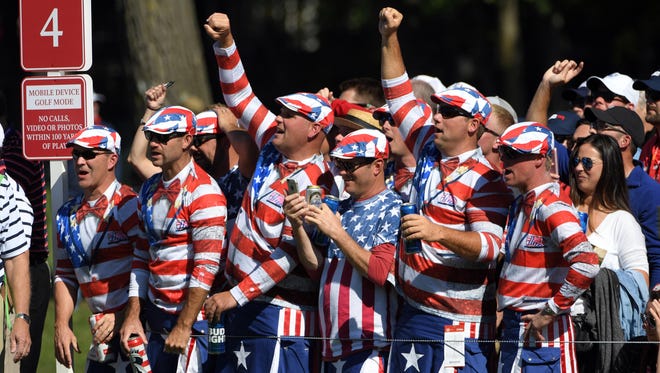Is loud, boisterous Hazeltine the new Brookline?
CHASKA, Minn. — As another taut Ryder Cup was approaching its day of reckoning, there were troubling signs that Hazeltine National was turning into another Brookline, a boisterous, nasty and downright hostile environment for the visiting Europeans.

While the teaming U.S. crowds loudly cheered European miscues starting at the early morning matches Friday, events grew more serious Saturday afternoon when European star Rory McIlroy was vulgarly heckled by a fan standing no more than five feet away while leaving the 7th green.
Instead of ignoring the taunts and carrying on to the 8th tee, McIlroy abruptly stopped and walked toward the culprit, yelling, “Get him out of here.” A marshal standing at the spot told USA TODAY Sports that the fan would be removed from the course.
“It’s a tough environment for us to come and play in,” McIlroy said after he had chalked up another victory Saturday afternoon.
At Brookline 17 years ago, the raucous, jingoistic and thoroughly inappropriate behavior of some American fans didn’t fully materialize until the final afternoon, as Europe famously frittered away a 10-6 lead to lose, 14 ½-13 ½.
Here, it started much earlier. After three consecutive Ryder Cup losses for the Americans, the hunger for a home victory is palpable on the course, so much so that sportsmanship, the admirable tenet that this event believes it was founded upon, is in danger of taking a back seat to patriotism.
Rory McIlroy gets fan thrown out at Ryder Cup after insult
There were shouts of glee as McIlroy’s approach to the first hole on Friday afternoon rolled not closer to the hole, but further from it. Then, on Saturday, European rookie Matthew Fitzpatrick’s water-bound slice on 16 prompted delighted cheers as he and Henrik Stenson lost to Brandt Snedeker and Brooks Koepka. Seconds later, as Chris Wood’s attempt to reach the green slid dangerously towards the drink, there were eager cries of “go, go, go”, before the ball teetered to a safe stop.
When Wood’s playing partner Justin Rose splashed his approach to give Jimmy Walker and Zach Johnson a shot at a comeback, the cheers were jubilant and deafening.
To be clear, the noise emanates not from the entire audience, far from it. As is the nature of these things, a vocal minority overshadows the thousands of others who offer polite and respectful applause but steer clear of celebrating European misfortune.
Does this even matter? Aren't sports fans allowed to be vocal?
Rory McIlroy dishes it right back to 'hostile' crowd at Hazeltine
The Ryder Cup treads a fine line. It is not football or baseball, where every action can and should be worthy of fan reaction, but neither is it the sedate world of regular tournament golf, where decorum prevails. The Cup would be nothing without patriotism, but finding a comfortable balance is no easy task. While the matches having been thrilling so far, already Hazeltine is notable in that alarming incidents of unseemly spectator behavior have bubbled to the surface far quicker than normal.
What happened at The Country Club in Brookline in 1999 is the stuff of Ryder Cup lore, for reasons right and wrong. There wasn’t much for American fans to cheer during the first two days as Europe built its big advantage. But, on Sunday, as the U.S. team staged an historic comeback to win the Cup, the fan behavior spiraled into a boozy, unsportsmanlike display that both countries have been at pains to avert since.
European star Colin Montgomerie was heckled to such an extent that his opponent, American Payne Stewart, personally sought out security officers to have certain fans expelled.
As victory beckoned, U.S. players, caddies, wives and girlfriends stormed the 17th green in celebration of a long Justin Leonard putt. That was problematic because Europe’s Jose Maria Olazabal was still standing on the green, waiting for his turn to putt.
For this and other reasons, it was universally agreed that Brookline went too far, and that no one wants to see a repeat. Neither does anyone have an appetite for silence.
However, if things escalate, as they tend to do on Sundays, when alcohol, tension and national spirit take over, the U.S. could lose more than just a trophy.
PHOTOS: RYDER CUP WEEK
